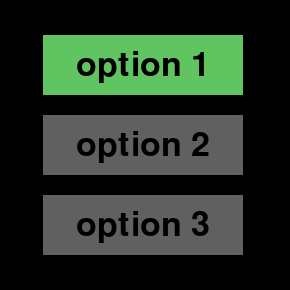I recommend implementing a class for graphical UI elements. The class has a constructor (__init__) that defines all required attributes and all required states. A Draw method that draws the entire UI element depending on its current state. The class should have an update method that receives the events, changes the state of the UI:
class OptionBox():
def __init__(self, x, y, w, h, color, ...):
...
def draw(self, surf):
...
def update(self, event_list):
...
See also UI elements and see some examples:
Dropdown menu

Radio Button

Option Box:

import pygame
class OptionBox():
def __init__(self, x, y, w, h, color, highlight_color, font, option_list, selected = 0):
self.color = color
self.highlight_color = highlight_color
self.rect = pygame.Rect(x, y, w, h)
self.font = font
self.option_list = option_list
self.selected = selected
self.draw_menu = False
self.menu_active = False
self.active_option = -1
def draw(self, surf):
pygame.draw.rect(surf, self.highlight_color if self.menu_active else self.color, self.rect)
pygame.draw.rect(surf, (0, 0, 0), self.rect, 2)
msg = self.font.render(self.option_list[self.selected], 1, (0, 0, 0))
surf.blit(msg, msg.get_rect(center = self.rect.center))
if self.draw_menu:
for i, text in enumerate(self.option_list):
rect = self.rect.copy()
rect.y += (i+1) * self.rect.height
pygame.draw.rect(surf, self.highlight_color if i == self.active_option else self.color, rect)
msg = self.font.render(text, 1, (0, 0, 0))
surf.blit(msg, msg.get_rect(center = rect.center))
outer_rect = (self.rect.x, self.rect.y + self.rect.height, self.rect.width, self.rect.height * len(self.option_list))
pygame.draw.rect(surf, (0, 0, 0), outer_rect, 2)
def update(self, event_list):
mpos = pygame.mouse.get_pos()
self.menu_active = self.rect.collidepoint(mpos)
self.active_option = -1
for i in range(len(self.option_list)):
rect = self.rect.copy()
rect.y += (i+1) * self.rect.height
if rect.collidepoint(mpos):
self.active_option = i
break
if not self.menu_active and self.active_option == -1:
self.draw_menu = False
for event in event_list:
if event.type == pygame.MOUSEBUTTONDOWN and event.button == 1:
if self.menu_active:
self.draw_menu = not self.draw_menu
elif self.draw_menu and self.active_option >= 0:
self.selected = self.active_option
self.draw_menu = False
return self.active_option
return -1
pygame.init()
clock = pygame.time.Clock()
window = pygame.display.set_mode((640, 480))
list1 = OptionBox(
40, 40, 160, 40, (150, 150, 150), (100, 200, 255), pygame.font.SysFont(None, 30),
["option 1", "2nd option", "another option"])
run = True
while run:
clock.tick(60)
event_list = pygame.event.get()
for event in event_list:
if event.type == pygame.QUIT:
run = False
selected_option = list1.update(event_list)
if selected_option >= 0:
print(selected_option)
window.fill((255, 255, 255))
list1.draw(window)
pygame.display.flip()
pygame.quit()
exit()
